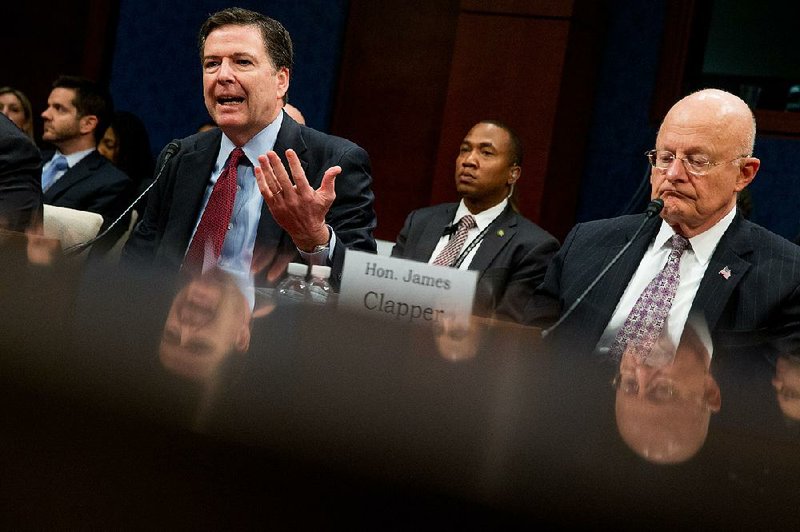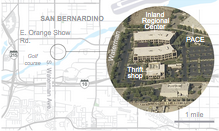WASHINGTON -- Apple Inc. on Thursday asked a federal magistrate judge to reverse an order that the company help the FBI hack into a locked iPhone.
In a court filing, the tech company accused the federal government of seeking "dangerous power" through the courts and of trampling on its constitutional rights.
The filing represents Apple's first official response since the judge's order last week and builds upon arguments voiced by the company's chief executive and supporters. It marks the latest salvo in a court fight that could establish new legal boundaries in the policy battle between national security and digital privacy -- a clash FBI Director James Comey says is the "hardest question I've seen in government."
"No court has ever authorized what the government now seeks, no law supports such unlimited and sweeping use of the judicial process, and the Constitution forbids it," Apple said.
The Justice Department is proposing a "boundless interpretation" of the law that, if left unchecked, could bring disastrous repercussions, the company warned in a memo submitted to U.S. Magistrate Judge Sheri Pym that challenges policy justifications put forward by the Obama administration in the past several days.
"The government says: 'Just this once' and 'Just this phone.' But the government knows those statements are not true," lawyers for Apple wrote.
If Apple were required to build the software the FBI wants, the lawyers argued, "criminals, terrorists and hackers will no doubt view the code as a major prize and can be expected to go to considerable lengths to steal it."
Justice Department lawyers were reviewing Apple's brief and will respond, said spokesman Melanie Newman. She said Apple had reversed "its long-standing" cooperation with government requests, and that when Justice Department officials want to search a phone or another electronic device, "we narrowly target our request to apply to the individual device" and get a judge's approval.
A hearing is scheduled for next month. A judge in New York has yet to rule in a similar but separate case.
Apple had until today to file its formal objection, but in submitting its brief on Thursday, the company got ahead of a scheduled shareholders meeting and took attention away from Comey, who defended the Justice Department's stance in two appearances before Congress.
Comey is scheduled to testify again before Congress next week, federal authorities announced Thursday.
Apple's general counsel, Bruce Sewell, also will appear Tuesday before a separate panel, according to the House Judiciary Committee.
"Americans have a right to strong privacy protections, and Congress should fully examine the issue to be sure those are in place while finding ways to help law enforcement fight crime and keep us safe," Judiciary Committee Chairman Bob Goodlatte, R-Va., and ranking Democratic member Rep. John Conyers of Michigan said in a joint statement Thursday.
Sewell's panel also will include Manhattan District Attorney Cyrus Vance Jr. . Vance and William Bratton, the New York City police commissioner, released a statement last week saying that Apple's refusal to comply with the FBI is proof of how tech companies "are thwarting serious criminal investigations and impeding public safety."
Comey wrote a public letter asking people to "take a deep breath" and insisting that the government is not trying to set a precedent with its request.
"Maybe the phone holds the clue to finding more terrorists," he wrote. "Maybe it doesn't. But we can't look the survivors in the eye, or ourselves in the mirror, if we don't follow this lead."
Justice Agency's Request
The dispute broke into public view last week when Pym directed Apple to help the FBI gain access to a phone used by one of the assailants in the San Bernardino, Calif., attacks.
Federal agents haven't been able to open the phone of Syed Farook because they don't know the pass code. The Justice Department wants Apple to create specialized software for the iPhone that would bypass some security features so that the FBI can try as many pass codes as possible without the data being erased.
The Justice Department has repeatedly maintained that it's seeking specialized software for just one phone as part of an investigation into an act of terrorism that left 14 people dead, and that Apple could retain and destroy the software once the process ends. On Thursday, Comey said the idea that the software could get "out in the wild" was not a legitimate concern.
But Apple said the specialized software the government wants it to build does not currently exist and "would require significant resources and effort to develop," including the work of six to 10 engineers working two to four weeks. The magistrate judge suggested in her ruling that the government would be required to pay Apple's costs.
Apple compared forcing it to create software that doesn't exist to weaken the iPhone's locks to forcing a journalist to publish false information to arrest a fugitive or forcing another software company to implant a virus in a customer's computer so the government could eavesdrop.
And it accused the government of working under a closed courtroom process under the auspices of a terrorism investigation of trying "to cut off debate and circumvent thoughtful analysis."
"The government wants to compel Apple to create a crippled and insecure product," the company said. "Once the process is created, it provides an avenue for criminals and foreign agents to access millions of iPhones."
In addition, Apple invoked the First Amendment in arguing that computer code is akin to free speech and that forcing it to write the new software would run afoul of its constitutional rights.
Apple pointedly noted the U.S. government itself fell victim to hackers, when thieves stole the personal information of tens of millions of current and former federal workers and their family members from the U.S. Office of Personnel Management.
While Apple and the Justice Department battled in federal court, members of Congress were looking at legislation that would require companies to help law enforcement agencies access electronic devices locked by encryption.
Microsoft backs Apple
From the tech industry, Microsoft Corp. affirmed support for Apple in its fight over unlocking the phone.
Brad Smith, Microsoft president and chief legal officer, said at a congressional hearing that the company will file an amicus brief to support Apple next week.
Asked about Apple's contention that the case is about more than one phone, Smith said "every case has implications for others."
Google also plans to file a "friend of the court" brief on Apple's behalf within the next week, a person familiar with the situation said. The person asked not to be identified because Google is still drafting the document.
Google makes the Android software that powers most smartphones in the world. Like Apple, it fears creating a precedent for authorities.
Microsoft has so far not commented on the case beyond participating in a statement last week from an industry group that said that while it's "extremely important" to deter crime and terrorism, no company should be required to build back doors to their own technology.
Microsoft itself is fighting the U.S. government over an order to turn over a drug-trafficking suspect's emails that are stored in one of the company's data centers in Ireland. Apple has backed Microsoft in that case, which is awaiting the ruling of an appellate court in New York.
Earlier this week, Microsoft co-founder Bill Gates told Bloomberg Go morning show he was "disappointed" by reports that he supports the U.S. government in this dispute, saying it doesn't accurately reflect his opinion.
"That doesn't state my view on this," he said in an interview. "The extreme view that government always gets everything, nobody supports that. Having the government be blind, people don't support that."
The Financial Times newspaper reported that Gates sided with the U.S. government, saying that the court order requiring Apple to help unlock the phone was a one-time request and "no different" from accessing bank and telephone records.
Information for this article was contributed by Eric Tucker, Tami Abdollah, Ted Bridis, Richard Lardner and Michael Liedtke of The Associated Press; by Dina Bass of Bloomberg News; and by Mark Berman of The Washington Post.
A Section on 02/26/2016


